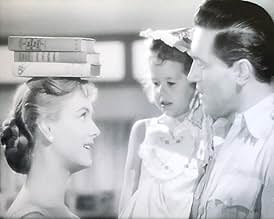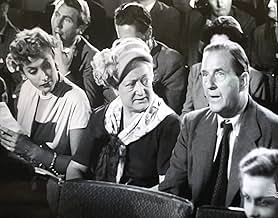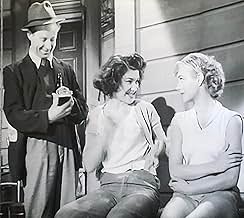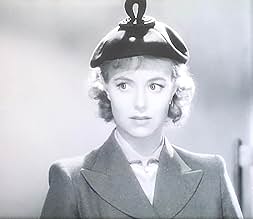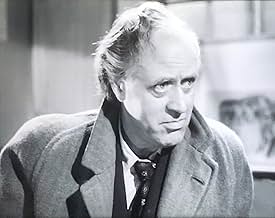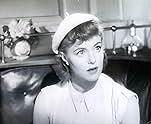IMDb-BEWERTUNG
5,8/10
438
IHRE BEWERTUNG
Füge eine Handlung in deiner Sprache hinzuAn unsophisticated and impressionable young girl finds herself in trouble after winning a beauty pageant.An unsophisticated and impressionable young girl finds herself in trouble after winning a beauty pageant.An unsophisticated and impressionable young girl finds herself in trouble after winning a beauty pageant.
- Regie
- Drehbuch
- Hauptbesetzung
Eddie Leslie
- Comic
- (as Eddy Leslie)
Empfohlene Bewertungen
Pauline Stroud the star of Lady Godiva Rides Again had a respectable career. But
a lot of very familiar folks are down the cast list of this film
In Lady Godiva Strikes Again, Stroud a working class girl from the midlands who on a lark enters a beauty contest and wins. She gets to ride as Lady Godiva did through the streets of Coventry, but this could also mean a career in the British cinema.
Her father Stanley Holloway playing a role as dad that Eugene Pallette would have done in America is real skeptical about this. So's her working class boyfriend George Cole, nice guy but a bit of a lout. No reason she shouldn't reach for the stars.
Dennis Price is the nominal star of this film, but he's got a limited amount of screen time. He plays a supercilious screen star, a whole lot like the part he did in Kind Hearts And Coronets. An arranged studio date with Stroud turns out to be a disaster all around with the paparazzi getting a most indelicate picture of him.
Down the cast list though you will find British beauties Diana Dors and Joan Collins and Kay Kendall as contestants, Sidney James as a casting director and Alastair Sim as a milk drinking (ulcers) studio head. Even Trevor Howard who was a reigning star of the UK cinema has an unbilled walk on.
It all does work out in the end and Stroud's a wiser girl for it. Lady Godiva never had a ride like this though.
In Lady Godiva Strikes Again, Stroud a working class girl from the midlands who on a lark enters a beauty contest and wins. She gets to ride as Lady Godiva did through the streets of Coventry, but this could also mean a career in the British cinema.
Her father Stanley Holloway playing a role as dad that Eugene Pallette would have done in America is real skeptical about this. So's her working class boyfriend George Cole, nice guy but a bit of a lout. No reason she shouldn't reach for the stars.
Dennis Price is the nominal star of this film, but he's got a limited amount of screen time. He plays a supercilious screen star, a whole lot like the part he did in Kind Hearts And Coronets. An arranged studio date with Stroud turns out to be a disaster all around with the paparazzi getting a most indelicate picture of him.
Down the cast list though you will find British beauties Diana Dors and Joan Collins and Kay Kendall as contestants, Sidney James as a casting director and Alastair Sim as a milk drinking (ulcers) studio head. Even Trevor Howard who was a reigning star of the UK cinema has an unbilled walk on.
It all does work out in the end and Stroud's a wiser girl for it. Lady Godiva never had a ride like this though.
This was a hugely enjoyable film for those of us who were around when it was made. Even sixty years on I can still remember Battersea Funfair.
What I do wonder though, is how many in a modern audience will get all the topical jokes, a few for instance: the reference to Johnny being a butter patter: in those days Sainsbury's cut butter from a block, and patted it with wooden patters to the required weight; in the cinema Johnny buys a brickette ice-cream (without wafers); the 10/- fine if a half-naked girl moved during a tableau (Lord Chamberlain's rules - see Mrs Henderson Presents).
Among the nice touches: Alistair Sim's cameo as Hawtry Murington was quite brilliant from the opening, louring, shot of him to his accurate critique of the problems facing the British film industry; as Marjorie goes into see Otto Mann, casting director, a couch is just inside the door.
Although set in the North, the exterior shot of Chanters store is of Bentalls in Kingston. The station with the train back home is Kings Cross (the coaches are Eastern Region). And was the pawnbroker an uncredited Bernard Miles? Oh, and wasn't the 20 year old Diana Dors a dish? (And can somebody identify Joan Collins for me please).
The whole thing was a delight from start to finish (despite the lack of regional accents among the girls).
What I do wonder though, is how many in a modern audience will get all the topical jokes, a few for instance: the reference to Johnny being a butter patter: in those days Sainsbury's cut butter from a block, and patted it with wooden patters to the required weight; in the cinema Johnny buys a brickette ice-cream (without wafers); the 10/- fine if a half-naked girl moved during a tableau (Lord Chamberlain's rules - see Mrs Henderson Presents).
Among the nice touches: Alistair Sim's cameo as Hawtry Murington was quite brilliant from the opening, louring, shot of him to his accurate critique of the problems facing the British film industry; as Marjorie goes into see Otto Mann, casting director, a couch is just inside the door.
Although set in the North, the exterior shot of Chanters store is of Bentalls in Kingston. The station with the train back home is Kings Cross (the coaches are Eastern Region). And was the pawnbroker an uncredited Bernard Miles? Oh, and wasn't the 20 year old Diana Dors a dish? (And can somebody identify Joan Collins for me please).
The whole thing was a delight from start to finish (despite the lack of regional accents among the girls).
Marjorie Clark, a working-class girl from an industrial Midlands town, becomes a local celebrity when she is chosen to play Lady Godiva in a local pageant. Much against the wishes of her puritanical old father and her possessive boyfriend Johnny she enters a beauty contest, and accidentally wins after the organiser's attempt to rig the contest in favour of his girlfriend misfires. Marjorie becomes a national celebrity and for a time enjoys success as a model, but has less success when she tries to conquer the world of showbiz despite having very little talent for acting, singing or dancing.
In Britain the film was known as "Lady Godiva Rides Again", but was released in the United States as "Bikini Baby", in a particularly dishonest piece of marketing. The poster designed for the American market proclaimed in huge letters "starring Diana Dors" accompanied by a picture of Dors in a bikini. Beneath, in smaller letters, it mentioned Kay Kendall and Stanley Holloway, and "dozens of beauty queens and artists' models!", but made no mention of the film's actual leading lady Pauline Stroud, who plays Marjorie. Contrary to the impression given by the poster, Dors plays a secondary character who appears only in a couple of scenes.
The marketing may have been dishonest, but I can see why it was done. Dors, oozing sex appeal and charisma from every pore, steals every scene she is in. Her character Dolores August- she who should have won the contest but didn't- is the sort of girl for whom the expression "fur coat and no knickers" could have been invented. She will drop her knickers for any man who might advance her career, and would sell her soul for a fur coat. It is no surprise that in Britain Dors became the leading sex symbol of the fifties. (Internationally her success was to be more limited).
Some films on the well-worn theme of "it's grim in showbiz" can be serious, even tragic, in tone, but this one is mainly a light-hearted comedy. There is a good deal of satire at the expense of the entertainment industry, and not just crooked beauty contests. The opening scene, showing Marjorie's home town on a rain-sodden Sunday afternoon, seems to be a parody of the then-popular "kitchen sink" social-realist genre, possibly inspired by one of the best-known films in that genre, Robert Hamer's "It Always Rains on Sunday". The "glamour school" which Marjorie attends seems to have been a dart aimed at Rank's "charm school", a training-ground for young actresses which concentrated more on looks and deportment than on acting ability. Dennis Price appears as Simon Abbott, a smoothly lecherous matinee idol who tries to get every girl he meets into bed with him. (Several real-life matinee idols might have recognised themselves in this portrayal). There is an amusing cameo from Alastair Sim as Hawtrey Mewington, an ageing, down-on-his-luck film producer, forever bemoaning the (alleged) fact that the once-great British film industry was being ruined by competition from television and Hollywood. (Memo to HM Government: Do more to support British cinema!)
Dors, Price and Sim are not the only big-name stars who appear in small roles. Holloway plays Marjorie's father and Kendall her sister. George Cole is Johnny, Sid James (not as big a star in 1951 as he was to become later) appears briefly as a sleazy impresario, and if you blink you might miss Dora Bryan and Googie Withers. Trevor Howard makes an uncredited as appearance as a theatre patron. This is, in fact, the sort of film in which all the small parts are played by big names and the only big part by a small name. Stroud never went on to become a major star, which does not really surprise me. She was pretty but lacked Dors's charisma, and on the evidence of this film lacked talent as well. (She also sounds too posh for a working-class Midlands girl, but is not alone in that. In the scenes set in the Midlands all the female characters speak with genteel RP accents and the male ones sound like Cockneys). The film as a whole, in fact, is quite amusing and provides us with an interesting look at British life in the early fifties. With a stronger actress in the lead, however, it could have been a lot better. 6/10
There are two strange coincidences about this film, both involving Dors. The contestants at the beauty contest include, besides Stroud and Dors, not only a teenage Joan Collins in her film debut but also a then-unknown model and actress named Ruth Ellis. In 1955 Ellis was to become famous, but sadly not for her acting or modelling. She was sentenced to death after shooting dead her abusive boyfriend, becoming the last woman to be executed in Britain. When a fictionalised version of Ellis's story, "Yield to the Night", was made soon afterwards, Dors, who had befriended Ellis during the making of "Lady Godiva Rides Again", was cast in the leading role.
In one scene there is a scuffle between Johnny and Abbott, who has cast his lustful eye on Marjorie, ending with Abbott falling into the river. As a result of the ensuing bad publicity, the film studio who have signed Marjorie up as a starlet sack her, invoking a "morality clause" in her contract. This closely parallels what was to happen to Dors during her ill-fated attempt to conquer Hollywood a few years later. A scuffle between her husband Dennis Hamilton and a photographer ended with several people falling into a swimming pool. As a result of the ensuing bad publicity, Dors's studio sacked her, invoking a "morality clause" in her contract.
In Britain the film was known as "Lady Godiva Rides Again", but was released in the United States as "Bikini Baby", in a particularly dishonest piece of marketing. The poster designed for the American market proclaimed in huge letters "starring Diana Dors" accompanied by a picture of Dors in a bikini. Beneath, in smaller letters, it mentioned Kay Kendall and Stanley Holloway, and "dozens of beauty queens and artists' models!", but made no mention of the film's actual leading lady Pauline Stroud, who plays Marjorie. Contrary to the impression given by the poster, Dors plays a secondary character who appears only in a couple of scenes.
The marketing may have been dishonest, but I can see why it was done. Dors, oozing sex appeal and charisma from every pore, steals every scene she is in. Her character Dolores August- she who should have won the contest but didn't- is the sort of girl for whom the expression "fur coat and no knickers" could have been invented. She will drop her knickers for any man who might advance her career, and would sell her soul for a fur coat. It is no surprise that in Britain Dors became the leading sex symbol of the fifties. (Internationally her success was to be more limited).
Some films on the well-worn theme of "it's grim in showbiz" can be serious, even tragic, in tone, but this one is mainly a light-hearted comedy. There is a good deal of satire at the expense of the entertainment industry, and not just crooked beauty contests. The opening scene, showing Marjorie's home town on a rain-sodden Sunday afternoon, seems to be a parody of the then-popular "kitchen sink" social-realist genre, possibly inspired by one of the best-known films in that genre, Robert Hamer's "It Always Rains on Sunday". The "glamour school" which Marjorie attends seems to have been a dart aimed at Rank's "charm school", a training-ground for young actresses which concentrated more on looks and deportment than on acting ability. Dennis Price appears as Simon Abbott, a smoothly lecherous matinee idol who tries to get every girl he meets into bed with him. (Several real-life matinee idols might have recognised themselves in this portrayal). There is an amusing cameo from Alastair Sim as Hawtrey Mewington, an ageing, down-on-his-luck film producer, forever bemoaning the (alleged) fact that the once-great British film industry was being ruined by competition from television and Hollywood. (Memo to HM Government: Do more to support British cinema!)
Dors, Price and Sim are not the only big-name stars who appear in small roles. Holloway plays Marjorie's father and Kendall her sister. George Cole is Johnny, Sid James (not as big a star in 1951 as he was to become later) appears briefly as a sleazy impresario, and if you blink you might miss Dora Bryan and Googie Withers. Trevor Howard makes an uncredited as appearance as a theatre patron. This is, in fact, the sort of film in which all the small parts are played by big names and the only big part by a small name. Stroud never went on to become a major star, which does not really surprise me. She was pretty but lacked Dors's charisma, and on the evidence of this film lacked talent as well. (She also sounds too posh for a working-class Midlands girl, but is not alone in that. In the scenes set in the Midlands all the female characters speak with genteel RP accents and the male ones sound like Cockneys). The film as a whole, in fact, is quite amusing and provides us with an interesting look at British life in the early fifties. With a stronger actress in the lead, however, it could have been a lot better. 6/10
There are two strange coincidences about this film, both involving Dors. The contestants at the beauty contest include, besides Stroud and Dors, not only a teenage Joan Collins in her film debut but also a then-unknown model and actress named Ruth Ellis. In 1955 Ellis was to become famous, but sadly not for her acting or modelling. She was sentenced to death after shooting dead her abusive boyfriend, becoming the last woman to be executed in Britain. When a fictionalised version of Ellis's story, "Yield to the Night", was made soon afterwards, Dors, who had befriended Ellis during the making of "Lady Godiva Rides Again", was cast in the leading role.
In one scene there is a scuffle between Johnny and Abbott, who has cast his lustful eye on Marjorie, ending with Abbott falling into the river. As a result of the ensuing bad publicity, the film studio who have signed Marjorie up as a starlet sack her, invoking a "morality clause" in her contract. This closely parallels what was to happen to Dors during her ill-fated attempt to conquer Hollywood a few years later. A scuffle between her husband Dennis Hamilton and a photographer ended with several people falling into a swimming pool. As a result of the ensuing bad publicity, Dors's studio sacked her, invoking a "morality clause" in her contract.
Made in the year of the Festival of Britain, this film is prefaced by a warning that it "Contains mild innuendo, cultural depictions of the era".
Pauline Stroud has long served as one the great warnings to aspiring actresses since she vanished almost without trace after playing the title role in this film, but actually aquits herself well and shows considerable cow-eyed charm.
Diana Dors as a hardened pro is supposed to be the film's glamour girl, but compared to the lovely Kay Kendal - wasted in a small part - she comes a very poor third; while harsh reality intrudes in the form of a predatory Dennis Price and Eddie Byrne's observation that life in austerity Britain for most girls consists of "seven years to live and then the kitchen sink."
Pauline Stroud has long served as one the great warnings to aspiring actresses since she vanished almost without trace after playing the title role in this film, but actually aquits herself well and shows considerable cow-eyed charm.
Diana Dors as a hardened pro is supposed to be the film's glamour girl, but compared to the lovely Kay Kendal - wasted in a small part - she comes a very poor third; while harsh reality intrudes in the form of a predatory Dennis Price and Eddie Byrne's observation that life in austerity Britain for most girls consists of "seven years to live and then the kitchen sink."
Alastair Sim, Diana Dors, Stanley Holloway, Dennis Price, George Cole and Sidney James in this Girl's Own story about a drippy young woman in the midlands chosen in a beauty pageant in Westbourne (Blackpool) to advertise soap.
All the actors play their respective characters, Diana Dors as a bad girl in the pageant, Stanley Holloway as the avuncular father, Dennis Price as a philandering film star, George Cole as a ingenuous working class piker, and Sidney James as a dodgy geezer running a strip show.
But it doesn't really save the contrived and well worn plot.
Wusstest du schon
- WissenswertesOne of the Beauty Queen contestants is a dark-haired Ruth Ellis, later to become infamous as the last woman hanged in Britain for murder and the subject of the movie Dance with a Stranger (1985).
- PatzerWhen Mrs. Clark complains about serving customers, while leaving her ironing, a shadow of the boom microphone is visible at the top of screen.
- Zitate
Hawtrey Murington - Optimum Films: The casting director is no longer with us. Murington alone remains, and he faces you.
Marjorie Clark: You mean you're "the" Mr. Murington?
Hawtrey Murington - Optimum Films: No longer "the" - - "that."
- SoundtracksHow Long Is Always?
Written by Leo Towers and Frankie Russell
Top-Auswahl
Melde dich zum Bewerten an und greife auf die Watchlist für personalisierte Empfehlungen zu.
- How long is Bikini Baby?Powered by Alexa
Details
- Erscheinungsdatum
- Herkunftsland
- Sprache
- Auch bekannt als
- Bikini Baby
- Drehorte
- The Leas Cliff Hall, Folkestone, Kent, England, Vereinigtes Königreich(setting of the Fascination Soap beauty pageant.)
- Produktionsfirma
- Weitere beteiligte Unternehmen bei IMDbPro anzeigen
- Laufzeit1 Stunde 38 Minuten
- Farbe
- Sound-Mix
- Seitenverhältnis
- 1.37 : 1
Zu dieser Seite beitragen
Bearbeitung vorschlagen oder fehlenden Inhalt hinzufügen

Oberste Lücke
By what name was Maxie macht Karriere (1951) officially released in Canada in English?
Antwort
